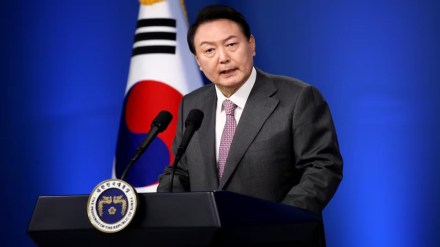South Korea plunged into a state of heightened tension on Sunday as President Yoon Suk Yeol declared martial law, a measure not seen in the nation for decades. Citing the need to purge alleged pro-North Korean elements threatening national security, the government granted the military sweeping authority to enforce laws and maintain order. The move has sent shockwaves across the nation, disrupting daily life, silencing the vibrant cultural scene, and sparking international concern.
The martial law declaration authorizes the military to enforce curfews, censor communications, and suppress gatherings deemed subversive. Government officials defended the action as a necessary step to counter what they described as an “unprecedented domestic threat,” but critics warn it could stifle South Korea’s democracy and civil liberties.
“Extraordinary circumstances call for extraordinary measures,” said a government spokesperson in a press briefing. “Our goal is to ensure stability and protect the integrity of the Republic of Korea.”
An Immediate Cultural Freeze: K-Pop Artists Silenced
One of the most visible effects of the martial law has been its chilling impact on South Korea’s globally acclaimed K-Pop industry. With millions of fans worldwide, K-Pop is often touted as a symbol of South Korea’s cultural renaissance and soft power. However, the industry now finds itself at the center of the crackdown.
Major entertainment companies, including HYBE, SM Entertainment, JYP Entertainment, and YG Entertainment, have reportedly received calls urging their artists to cancel appearances, refrain from attending public events, and avoid political commentary. Insiders say these instructions are framed as recommendations, but the implicit pressure is clear.
Prominent acts like BTS, BLACKPINK, and TWICE have already suspended upcoming concerts and fan meetings. A highly anticipated comeback showcase for BLACKPINK and a fan event for SEVENTEEN have been postponed indefinitely. Smaller groups and independent artists have also been forced to shelve performances, as venues across the country shut their doors.
“This isn’t just a setback for K-Pop artists; it’s a silencing of their voices,” said Kim Eun-Ji, a cultural analyst. “K-Pop has always represented freedom, creativity, and resilience, and now it’s being suppressed.”
Fans have taken to social media to voice their dismay. Hashtags such as #SaveKPop and #DemocracyInKorea trended globally, with international fans joining domestic voices to call for transparency and restraint.
“This is heartbreaking,” said Lina Park, a 19-year-old BLACKPINK fan from Busan. “K-Pop is about connecting with people, and this feels like losing that connection.”
Festivals and Public Events Cancelled Nationwide
The martial law has also cast a pall over South Korea’s lively public life. Major festivals, including the Busan International Film Festival and regional harvest celebrations, have been abruptly canceled. Tourist hotspots, including Seoul’s bustling Gangnam and Hongdae districts, have been placed under heavy military surveillance. Public gatherings have been discouraged, and organizers of private events face the risk of intervention if their activities are deemed politically sensitive.
“It’s devastating to see our cities quiet and our culture on hold,” said Park Hye-Soo, an event organizer in Seoul. “This level of control is not something we’ve seen in decades.”
Local businesses are bracing for financial losses as foot traffic plummets and tourist activity dries up. Hotels, restaurants, and entertainment venues are already reporting significant cancellations.
A Nation on Edge
The martial law decree has reignited memories of South Korea’s authoritarian past, particularly the military regimes of the 1970s and 1980s. The government’s insistence that the move is aimed solely at rooting out subversion has done little to allay fears of potential overreach.
“Martial law should be an absolute last resort,” said Lee Jin-Woo, a professor of political science at Yonsei University. “Its imposition raises serious concerns about the erosion of democratic norms in South Korea.”
Activists and opposition lawmakers have also condemned the move, calling for immediate oversight and accountability. The Korean Civil Liberties Union has warned of potential human rights abuses under the military’s expanded powers.
“This is a moment for South Koreans to come together and ensure our freedoms are not eroded,” said a spokesperson for the organization. “The international community must also remain vigilant.”
K-Pop’s Global Standing in Jeopardy
The disruption of South Korea’s cultural scene has implications far beyond its borders. K-Pop, a multi-billion-dollar industry, has long been a cornerstone of South Korea’s international brand, fostering goodwill and economic ties through its widespread appeal. Experts warn that prolonged restrictions could damage the industry’s momentum.
“K-Pop is not just entertainment; it’s a global phenomenon that represents South Korea’s openness and creativity,” said Yoon Min-Seok, a media studies expert. “Martial law risks tarnishing that image and alienating its global fanbase.”
Already, international concerts and appearances scheduled for K-Pop acts are facing delays. Agencies are reportedly reconsidering overseas commitments, wary of the reputational risks associated with the martial law crisis.
What’s Next for South Korea?
As South Korea grapples with this new chapter, the nation remains deeply divided. Supporters of the government’s actions argue that security concerns necessitate tough measures, while critics fear the long-term impact on the country’s democracy and global standing.
In the meantime, the streets of Seoul remain quiet, the stages are dark, and the vibrant world of K-Pop finds itself muted — a sobering reminder of the far-reaching consequences of martial law in a modern democracy.
